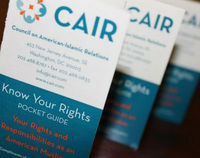The Greater Los Angeles Area office of the Council on American-Islamic Relations (CAIR-LA ), today issued a “Know Your Rights” community advisory for Iranian-Americans and others in Southern California who may be approached by law enforcement authorities in the wake of the recent assassination of a top Iranian general in a U.S. drone attack in Iraq.
“Know Your Rights” materials are available online in English, Arabic, Somali, Urdu, Farsi, Bengali, and Bosnian.
The multi-language civil rights materials may be printed out per personal use or for distribution at local events.
SEE: Download “Know Your Rights” Guides in Arabic, Bengali, Bosnian, Farsi, Somali, Urdu, and English
CAIR-LA recommends that community members follow the advice offered in its “Your Rights with Law Enforcement” booklet, including:
If you are visited by federal law enforcement agents, remember:
- You have the legal right to have a lawyer present when speaking with federal law enforcement agencies. This is true even if you are not a citizen or have been arrested or detained. This is your legal right. Refusing to answer questions cannot be held against you and does not imply that you have something to hide. Answering a question incorrectly can hurt you more than not answering at all. An attorney is best able to protect your rights.
- You do not have to permit any law enforcement officer to enter your home or office if they do not have a warrant. Law enforcement agents must have a search warrant, except in emergency situations, in order to enter your house. If they say they have a warrant, politely ask to see it before allowing them to enter. If they have a warrant, be courteous and polite, but remember that you are under no obligation to answer questions without a lawyer present. You should tell the agents that you do not consent to the search so that they cannot go beyond what the warrant authorizes.
- You should never lie or provide false information to any law enforcement agency. Lying to law enforcement agents under any circumstance is a federal crime.
Remember to ask any investigator who visits you for a business card so you can give it to your lawyer. At least get the name, contact information and agency of the officer.
If you are not a U.S. citizen and are contacted by a DHS official, remember:
- You have the right to an attorney. It is a good idea to carry the contact information of an immigration attorney who can help you.
- Never sign anything without reading, understanding and knowing the consequences of signing it. You have the right to have an attorney visit you if you are in detention and represent you at any immigration hearings.
- Federal law requires you to carry your registration documents with you at all times. Once your immigration status has been shown to an officer, you do not have to answer any other questions without having a lawyer present.
- You should not be asked improper questions. No DHS officer may ask you anything about your religious or political beliefs, groups that you belong to or contribute to, things that you have done or said in the past, or where you have traveled.”
If you feel like have you have been a victim of racial or religious profiling, contact the CAIR-LA Legal Department at 714-776-1177.
